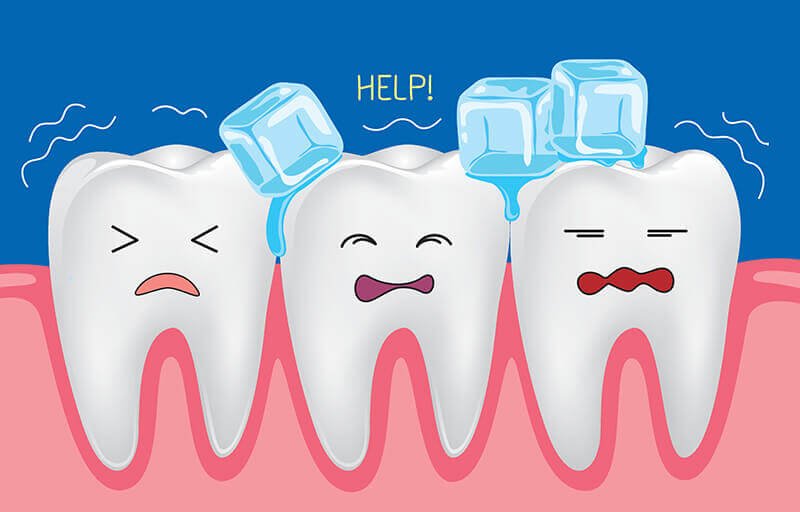Here’s an all-too-common scenario: You take a bite or a sip of something cold… and are shocked by a sudden snap of tooth pain.
Even if your teeth feel fine once the cold stimulus is gone, cold-sensitive tooth pain should never be ignored. The underlying problem could actually be quite serious.
What causes tooth pain, and how can that pain be prevented? Let’s take a look at common causes and effective solutions:
What Is Tooth Sensitivity?
Tooth pain is also known as dentinal hypersensitivity. Over 40 million adults in the U.S. have some degree of tooth sensitivity. Tooth pain can be caused by a number of different dental issues, so you’ll want to work with a dentist to determine exactly what’s going on.
Not being able to enjoy a scoop of ice cream is certainly no fun, but tooth pain can actually lead to many long-term problems, too. Sensitivity can interfere with your ability to brush properly. You might not spend enough time thoroughly cleaning sensitive areas of your mouth, which can result in additional problems such as decay.
What Causes Tooth Sensitivity?
Tooth sensitivity can be a bit tricky to properly diagnose. Here are some common causes:
- Receding Gums – Gum disease, plaque buildup, lack of dental care, genetics and more can all cause your gums to recede. As your gum levels lower, the roots of your teeth are exposed. These roots have tiny tubes which lead directly to the tooth’s nerve. Cold temps, cold air and other environmental factors pass through the tubes, irritate the nerve and result in tooth pain.
- Recent Dental Work – Tooth sensitivity can also be a temporary side effect of many dental procedures. Fillings commonly result in temporary tooth pain. Usually the pain will disappear on its own in about two to three weeks (although you still need to tell your dentist right away about any post-filling tooth aches).
- Dental Damage – Chipped teeth, cracked teeth, broken fillings and other damage can also cause pain problems. When the enamel of a tooth is damaged, the layer underneath (called dentin) is exposed. Food and liquid can now reach the tooth’s nerve through the exposed dentin.
Not much damage is required to expose the dentin layer. Even frequently clenching or grinding your teeth can be enough to create small notches in your gum line. In this case, you wouldn’t actually see any obvious cracks or damage.
When Should I See A Dentist?
Suppose you drink something cold and feel a sharp pain in your tooth, but the pain goes away quickly and doesn’t return. Should you see a dentist? If it’s a one-time event, you’re probably okay.
But if you have tooth pain more often than not when you drink or eat something cold, an appointment with a dentist is probably necessary. Tooth sensitivity which lasts longer more than two weeks, or worsens over time, also usually means a dentist should get involved.
Don’t let dental costs keep you from treatment. If you want an easy way to save, consider a dental discount plan. This is an affordable alternative to dental insurance. Depending on the specifics of the plan, you can save between 10% and 60% on a variety of dental procedures, including treatments for tooth sensitivity. Members start saving right away by presenting their membership card at any of the over 100,000 participating dentists.
How Is Tooth Sensitivity Treated?
Visiting a dentist is an important step in combating tooth pain. Only a dental professional will be able to determine what’s causing your tooth pain and then provide an appropriate treatment plan.
Some treatments are as simple as switching your brand of toothpaste. Tooth sensitivity can be increased by the abrasive chemicals found in certain types of toothpaste, especially whitening and tartar-control toothpaste. Your dentist will be able to suggest a desensitizing toothpaste. Special sealants might also be applied to your teeth.
Any underlying issues will also need to be treated. For instance, if your tooth pain is caused by gum disease, you might need a procedure called a deep cleaning, which removes buildup from pockets below the surface of the gum line.
Be as specific as possible when describing the pain to your dentist. Where do you feel the pain? What are you drinking or eating when the pain occurs? How long does the pain last and how often does it occur? Tooth pain is a common symptom of many dental issues, so you’ll need to work with your dentist to uncover the right diagnosis.
Tooth pain is a signal you should pay attention to. Fortunately, a dental savings plan can be a great way to save on a dental visit so that you can get treatment right away. Whether the cause of your tooth pain is simple or more complex, treatment options are available. You don’t need to live with cold-sensitive teeth.
Bring on the ice cream! (Just make sure to brush your teeth afterward.)


